File Info
| Exam | Designing and Implementing an Azure AI Solution |
| Number | AI-100 |
| File Name | Microsoft.AI-100.ActualTests.2020-02-05.67q.tqb |
| Size | 869 KB |
| Posted | Feb 05, 2020 |
| Download | Microsoft.AI-100.ActualTests.2020-02-05.67q.tqb |
How to open VCEX & EXAM Files?
Files with VCEX & EXAM extensions can be opened by ProfExam Simulator.
Coupon: MASTEREXAM
With discount: 20%
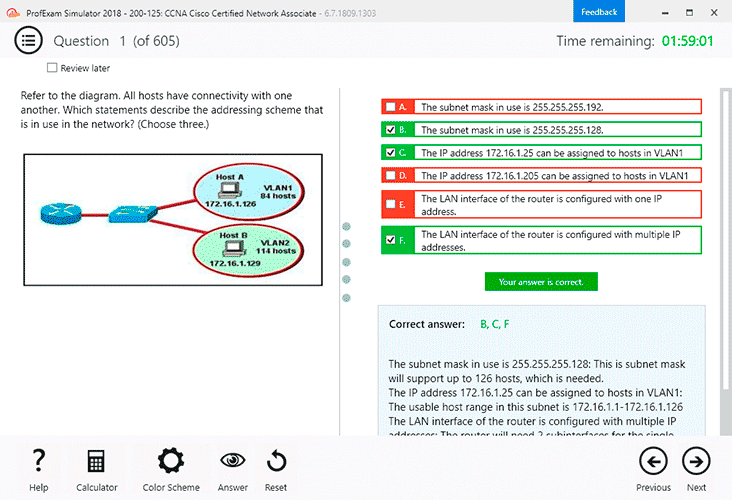
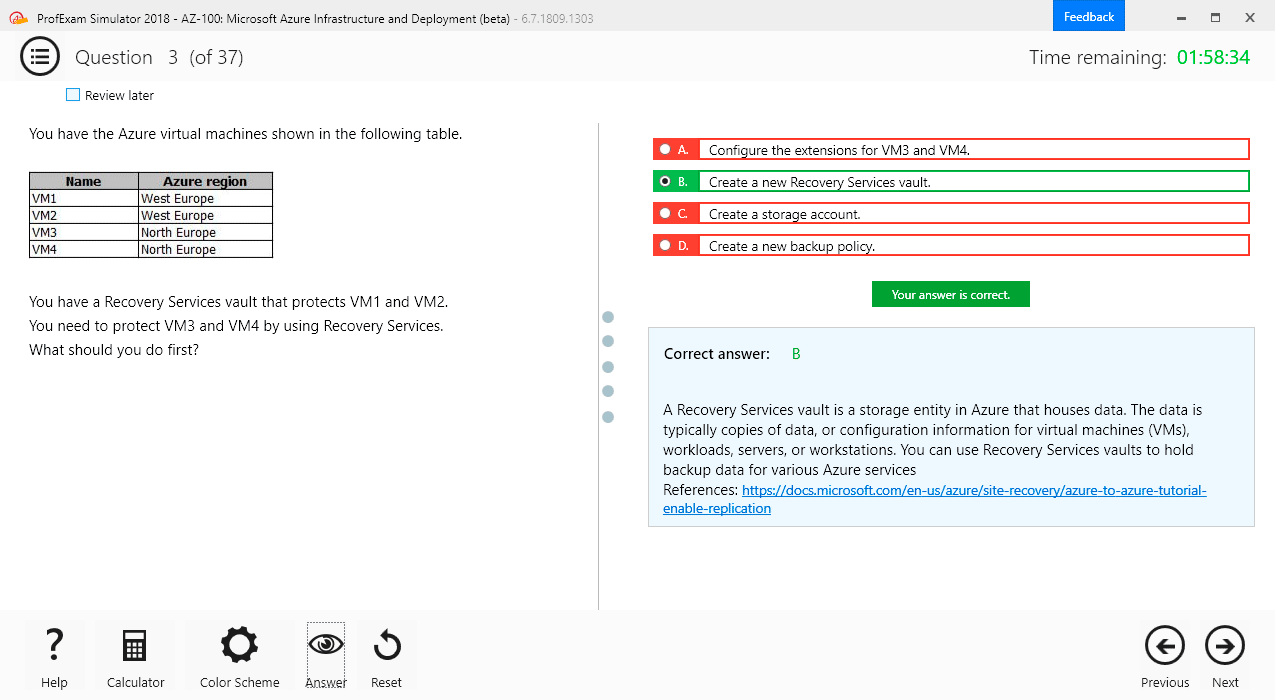
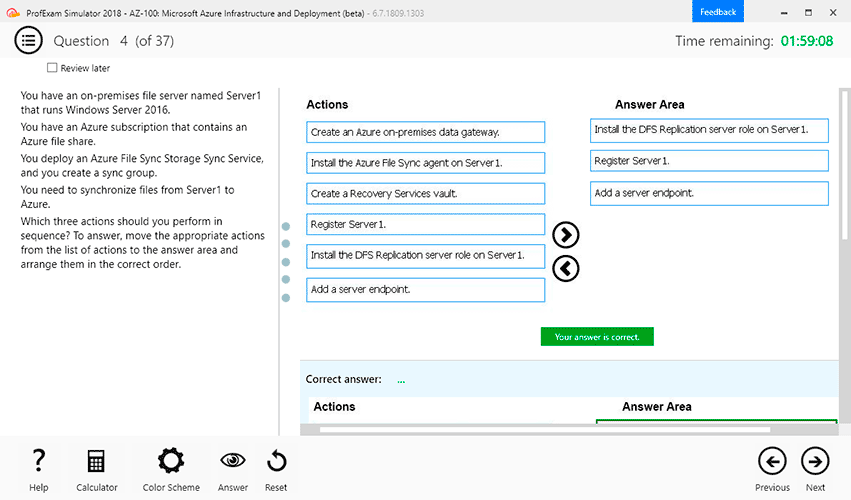
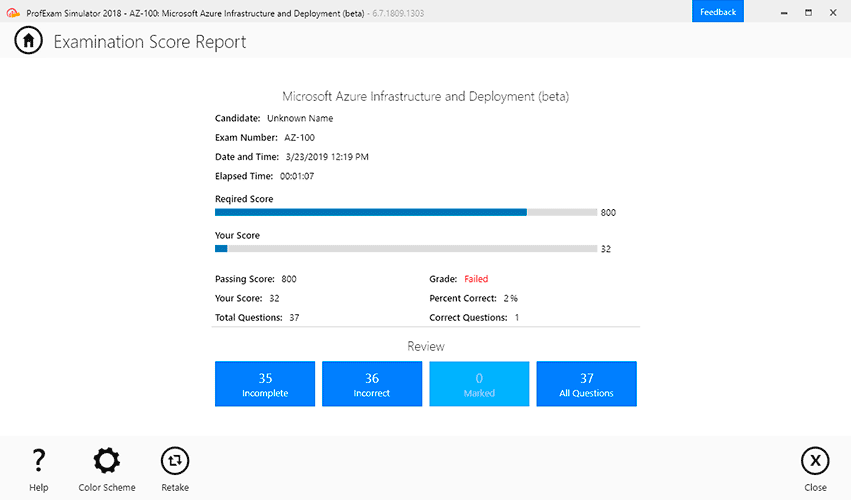
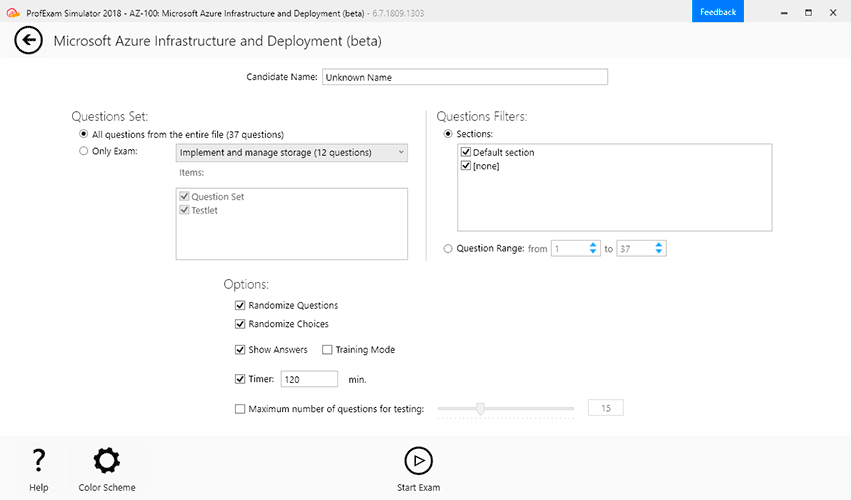
Demo Questions
Question 1
You plan to implement a new data warehouse for a planned AI solution.
You have the following information regarding the data warehouse:
- The data files will be available in one week.
- Most queries that will be executed against the data warehouse will be ad-hoc queries.
- The schemas of data files that will be loaded to the data warehouse will change often.
- One month after the planned implementation, the data warehouse will contain 15 TB of data.
You need to recommend a database solution to support the planned implementation.
What two solutions should you include in the recommendation? Each correct answer is a complete solution.
NOTE: Each correct selection is worth one point.
- Apache Hadoop
- Apache Spark
- A Microsoft Azure SQL database
- An Azure virtual machine that runs Microsoft SQL Server
Correct answer: C
Explanation:
References:https://docs.microsoft.com/en-us/azure/sql-database/saas-multitenantdb-adhoc-reporting References:
https://docs.microsoft.com/en-us/azure/sql-database/saas-multitenantdb-adhoc-reporting
Question 2
You are configuring data persistence for a Microsoft Bot Framework application. The application requires a structured NoSQL cloud data store.
You need to identify a storage solution for the application. The solution must minimize costs.
What should you identify?
- Azure Blob storage
- Azure Cosmos DB
- Azure HDInsight
- Azure Table storage
Correct answer: D
Explanation:
Table Storage is a NoSQL key-value store for rapid development using massive semi-structured datasets You can develop applications on Cosmos DB using popular NoSQL APIs. Both services have a different scenario and pricing model. While Azure Storage Tables is aimed at high capacity on a single region (optional secondary read only region but no failover), indexing by PK/RK and storage-optimized pricing; Azure Cosmos DB Tables aims for high throughput (single-digit millisecond latency), global distribution (multiple failover), SLA-backed predictive performance with automatic indexing of each attribute/property and a pricing model focused on throughput. References:https://db-engines.com/en/system/Microsoft+Azure+Cosmos+DB%3BMicrosoft+Azure+Table+Storage Table Storage is a NoSQL key-value store for rapid development using massive semi-structured datasets
You can develop applications on Cosmos DB using popular NoSQL APIs.
Both services have a different scenario and pricing model.
While Azure Storage Tables is aimed at high capacity on a single region (optional secondary read only region but no failover), indexing by PK/RK and storage-optimized pricing; Azure Cosmos DB Tables aims for high throughput (single-digit millisecond latency), global distribution (multiple failover), SLA-backed predictive performance with automatic indexing of each attribute/property and a pricing model focused on throughput.
References:
https://db-engines.com/en/system/Microsoft+Azure+Cosmos+DB%3BMicrosoft+Azure+Table+Storage
Question 3
You have an Azure Machine Learning model that is deployed to a web service.
You plan to publish the web service by using the name ml.contoso.com.
You need to recommend a solution to ensure that access to the web service is encrypted.
Which three actions should you recommend? Each correct answer presents part of the solution.
NOTE: Each correct selection is worth one point.
- Generate a shared access signature (SAS)
- Obtain an SSL certificate
- Add a deployment slot
- Update the web service
- Update DNS
- Create an Azure Key Vault
Correct answer: BDE
Explanation:
The process of securing a new web service or an existing one is as follows:Get a domain name. Get a digital certificate. Deploy or update the web service with the SSL setting enabled. Update your DNS to point to the web service. Note: To deploy (or re-deploy) the service with SSL enabled, set the ssl_enabled parameter to True, wherever applicable. Set the ssl_certificate parameter to the value of the certificate file and the ssl_key to the value of the key file. References:https://docs.microsoft.com/en-us/azure/machine-learning/service/how-to-secure-web-service The process of securing a new web service or an existing one is as follows:
- Get a domain name.
- Get a digital certificate.
- Deploy or update the web service with the SSL setting enabled.
- Update your DNS to point to the web service.
Note: To deploy (or re-deploy) the service with SSL enabled, set the ssl_enabled parameter to True, wherever applicable. Set the ssl_certificate parameter to the value of the certificate file and the ssl_key to the value of the key file.
References:
https://docs.microsoft.com/en-us/azure/machine-learning/service/how-to-secure-web-service

